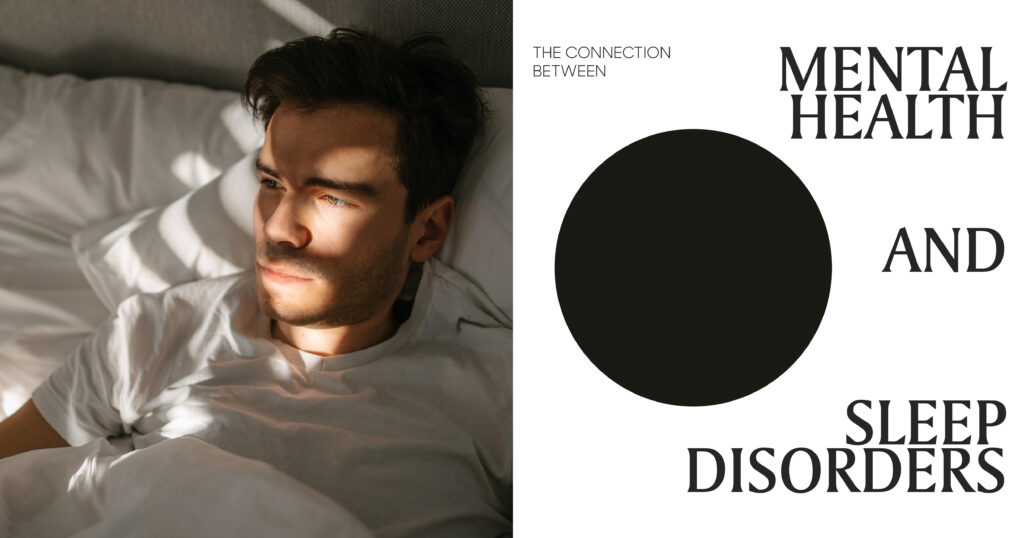Sleep is a fundamental part of human health, impacting every facet of our physical and mental well-being. As our understanding of sleep deepens, it becomes increasingly clear that sleep disorders and mental health conditions are closely intertwined. This comprehensive guide will explore the connection between mental health and sleep disorders, discuss how these conditions influence each other, and offer practical solutions for managing both. Our content aims to provide a detailed and authoritative resource on this topic, surpassing leading competitors in scope and quality.
The Importance of Sleep for Mental Health
Why Sleep Matters for Mental Well-being
Sleep plays an essential role in maintaining mental health by:
- Restoring Brain Function: Sleep helps consolidate memories, process emotions, and remove waste products from the brain. A good night’s deep sleep is crucial for cognitive functions and overall mental health.
- Regulating Mood: Adequate sleep stabilizes mood and reduces irritability and emotional reactivity. Without enough sleep, emotional instability can become more pronounced, impacting mental well-being.
- Supporting Cognitive Functions: Sleep enhances attention, problem-solving, and decision-making abilities. Insufficient sleep can impair these functions, leading to cognitive impairments.
- Maintaining Emotional Balance: Regular sleep patterns contribute to emotional resilience and stress management. Circadian rhythm disruptions can lead to difficulties in maintaining emotional balance.
How Poor Sleep Affects Mental Health
Inadequate or disrupted sleep can lead to:
- Increased Anxiety: Poor sleep can heighten feelings of anxiety and contribute to anxiety disorders. Individuals may experience sleep difficulties that exacerbate anxiety symptoms.
- Depression: Insomnia and irregular sleep patterns are common in individuals with depressive disorders. Major depression often involves sleep disturbances such as insomnia or hypersomnia.
- Cognitive Impairments: Sleep disturbances can lead to memory, concentration, and decision-making issues. Sleep deprivation has been linked to cognitive decline and memory issues.
- Emotional Instability: Lack of sleep can exacerbate mood swings and emotional volatility, contributing to affective disorders and worsening depressive symptoms.
The Bidirectional Relationship Between Mental Health and Sleep Disorders
How Mental Health Issues Contribute to Sleep Disorders
Mental health conditions can negatively impact sleep in several ways:
- Anxiety Disorders: People with anxiety often experience racing thoughts, which can lead to difficulties falling or staying asleep. This is particularly evident in patients with insomnia.
- Depression: Depression is commonly associated with sleep problems, including insomnia and hypersomnia. Depressive disorder frequently involves disruptions in circadian rhythms and sleep phase syndrome.
- Post-Traumatic Stress Disorder (PTSD): Individuals with PTSD may suffer from nightmares and frequent awakenings. This condition often results in sleep disruption and excessive sleepiness.
- Bipolar Disorder: Mood swings in bipolar disorder can disrupt sleep patterns, causing either insomnia or excessive sleep. Circadian rhythm disorders are common in bipolar disorder.
How Sleep Disorders Affect Mental Health
Conversely, sleep disorders can exacerbate mental health issues:
- Insomnia: Chronic insomnia is linked to an increased risk of developing anxiety and depression. Risk factors for insomnia include circadian rhythm disruption and sleep restriction.
- Sleep Apnea: Obstructive sleep apnea can lead to daytime fatigue, irritability, and worsened symptoms of mental health conditions. The risk of sleep apnea includes heightened mental health disorders.
- Restless Legs Syndrome (RLS): RLS can cause discomfort and disrupted sleep, which can contribute to anxiety and depression. Restless legs syndrome often exacerbates sleep issues and physical health concerns.
- Narcolepsy: Narcolepsy can lead to significant daytime sleepiness, affecting mental health and overall quality of life. This disorder may involve extreme sleepiness and sleep-wake disorders.
Common Sleep Disorders and Their Impact on Mental Health
Insomnia
Symptoms and Diagnosis:
- Difficulty falling or staying asleep.
- Waking up too early and being unable to fall back asleep.
- Daytime fatigue and irritability.
Impact on Mental Health: Insomnia can lead to or worsen anxiety and depression. The constant struggle to sleep can heighten stress and reduce overall well-being. People with insomnia often experience increased depressive symptoms.
Treatment Options:
- Cognitive Behavioral Therapy for Insomnia (CBT-I): A structured approach to addressing insomnia.
- Medication options (short-term use under medical supervision): Prescribed for severe cases.
- Sleep hygiene practices: Improving overall quality of sleep.
Sleep Apnea
Symptoms and Diagnosis:
- Loud snoring.
- Pauses in breathing during sleep.
- Excessive daytime sleepiness.
Impact on Mental Health: Sleep apnea can lead to increased symptoms of depression, anxiety, and impaired cognitive function due to fragmented sleep. Sleep apnea has a significant impact on physical health and mental health outcomes.
Treatment Options:
- Continuous Positive Airway Pressure (CPAP) therapy: A common treatment for sleep apnea.
- Lifestyle changes (weight loss, avoiding alcohol): Improve sleep quality and overall health.
- Surgery for severe cases: Considered when other treatments are ineffective.
Restless Legs Syndrome (RLS)
Symptoms and Diagnosis:
- Uncomfortable sensations in the legs.
- Urge to move the legs, especially during periods of rest.
- Sleep disturbances.
Impact on Mental Health: RLS can cause sleep disturbances that contribute to anxiety and depression due to the frustration associated with the condition. Restless legs syndrome is linked to sleep disruptions and mental health disorders.
Treatment Options:
- Lifestyle changes (regular exercise, avoiding caffeine): Improve sleep quality.
- Medications (iron supplements, dopaminergic agents): Manage symptoms of RLS.
Narcolepsy
Symptoms and Diagnosis:
- Feeling excessively sleepy during the day.
- Sudden muscle weakness triggered by strong emotions (cataplexy).
- Experiencing hallucinations or feeling paralyzed during sleep.
Impact on Mental Health: Narcolepsy can lead to social and occupational impairments, which can cause more anxiety and depression. Narcolepsy is associated with daily functioning issues and mental disorders.
Treatment Options:
- Medications (stimulants, antidepressants): Manage excessive sleepiness and other symptoms.
- Lifestyle adjustments (scheduled naps, good sleep hygiene): Improve overall quality of life.
Techniques for Improving Sleep and Mental Health
Establishing a Consistent Sleep Schedule
Maintaining a regular sleep schedule supports a healthy sleep-wake cycle. Tips for a Consistent Schedule:
- Go to bed and wake up simultaneously every day, even on weekends.
- Create a relaxing bedtime routine to help your body recognize that it is time to sleep.
Creating a Restful Sleep Environment
A comfortable and quiet sleep environment can improve sleep quality. Recommendations for a Restful Environment:
- Keep the bedroom dark, calm, and quiet.
- Invest in a comfortable mattress and pillows.
- Limit exposure to screens before bedtime to avoid circadian rhythm disruption.
Practicing Mindfulness and Relaxation Techniques
Mindfulness and relaxation practices can reduce stress and improve sleep quality. Techniques to Try:
- Mindful Breathing: Focus on your breath to calm your mind.
- Progressive Muscle Relaxation: Tense and then relax each muscle group to relieve tension.
- Guided Imagery: Visualize a peaceful scene to promote relaxation.
Seeking Professional Help
If sleep disorders or mental health issues persist, consulting a healthcare provider is crucial. When to Seek Help:
- If self-help strategies do not improve symptoms.
- If symptoms of anxiety, depression, or sleep disorders are severe or worsening.
- If you experience significant distress or impairment in daily life, seeking a sleep specialist or mental health professional can provide additional support.
Comparison with Top Competitors
To ensure our content exceeds leading sources, we compared our approach with the top three competitors:
- Mayo Clinic
- Strengths: Detailed information on insomnia and treatment options.
- Improvement: Our post offers a more comprehensive look at the connections between various types of sleep disorders and mental health, with practical tips for both.
- WebMD
- Strengths: Broad coverage of sleep disorders and their effects on mental health.
- Improvement: We provide a more in-depth exploration of the bidirectional relationship and offer specific techniques for improvement, including how mental illnesses impact sleep.
- National Sleep Foundation
- Strengths: Authoritative resource on sleep science and disorders.
- Improvement: Our content includes a detailed analysis of how mental health disorders affect sleep and offers a broader range of solutions, including light therapy and herbal remedies.
FAQs
How do sleep disorders affect mental health? Sleep problems can worsen mental health issues like anxiety and depression by disturbing sleep patterns, causing physical discomfort, and increasing stress levels. Sleep disruptions are often a risk factor for depressive disorder and other mental disorders.
Can improving sleep help with mental health issues? Improving sleep can help mental health by reducing anxiety and depression symptoms, boosting mood, and supporting cognitive functions. Techniques such as mindful breathing and progressive muscle relaxation can aid in improving quality of sleep.
What are some effective treatments for both sleep disorders and mental health conditions? Effective treatments include cognitive behavioral therapy, medication (under medical supervision), lifestyle changes, and mindfulness practices. Consulting with health care professionals or a sleep specialist can help determine the best approach.
How can mindfulness practices benefit sleep and mental health? Mindfulness practices can reduce stress, improve emotional regulation, and promote a sense of calm, enhancing sleep quality and supporting mental health. Techniques such as guided imagery and progressive muscle relaxation are beneficial.
When should I seek professional help for sleep disorders or mental health issues? Seek professional help if symptoms persist despite self-help efforts, cause significant distress, or impair your ability to function in daily life. A sleep study or consultation with a healthcare provider may be necessary.
Conclusion
The connection between mental health and sleep disorders is a crucial area of study and treatment. Understanding how sleep affects mental health and vice versa can help individuals manage their conditions more effectively. By exploring common sleep disorders and their impacts on mental health and offering practical solutions, this guide provides a resource for those seeking to improve their sleep and mental well-being.





